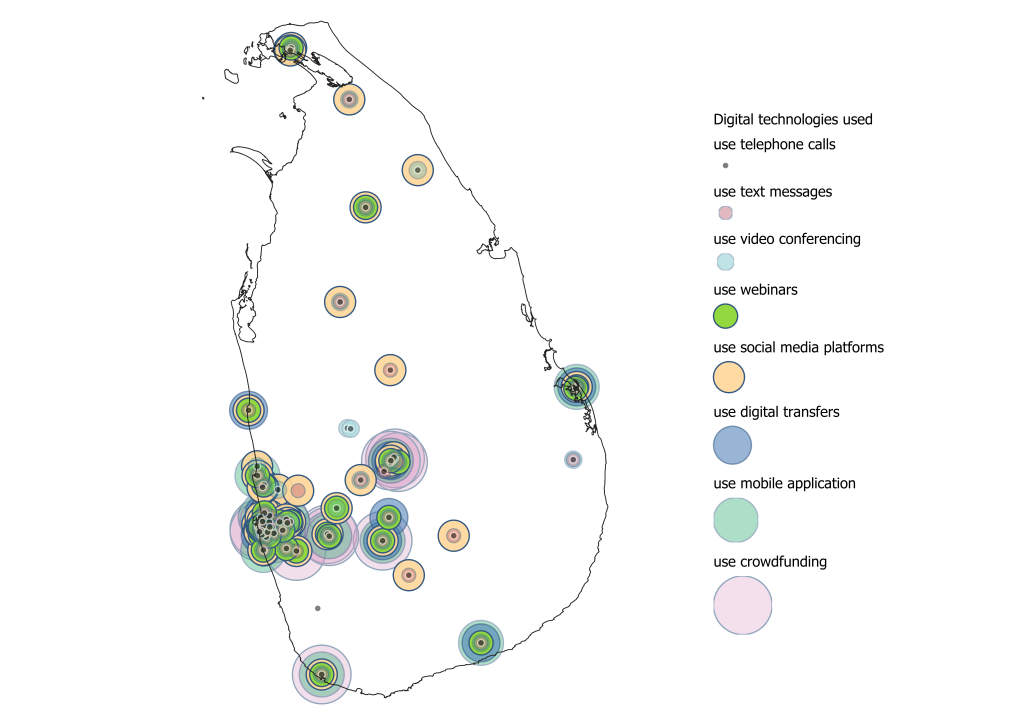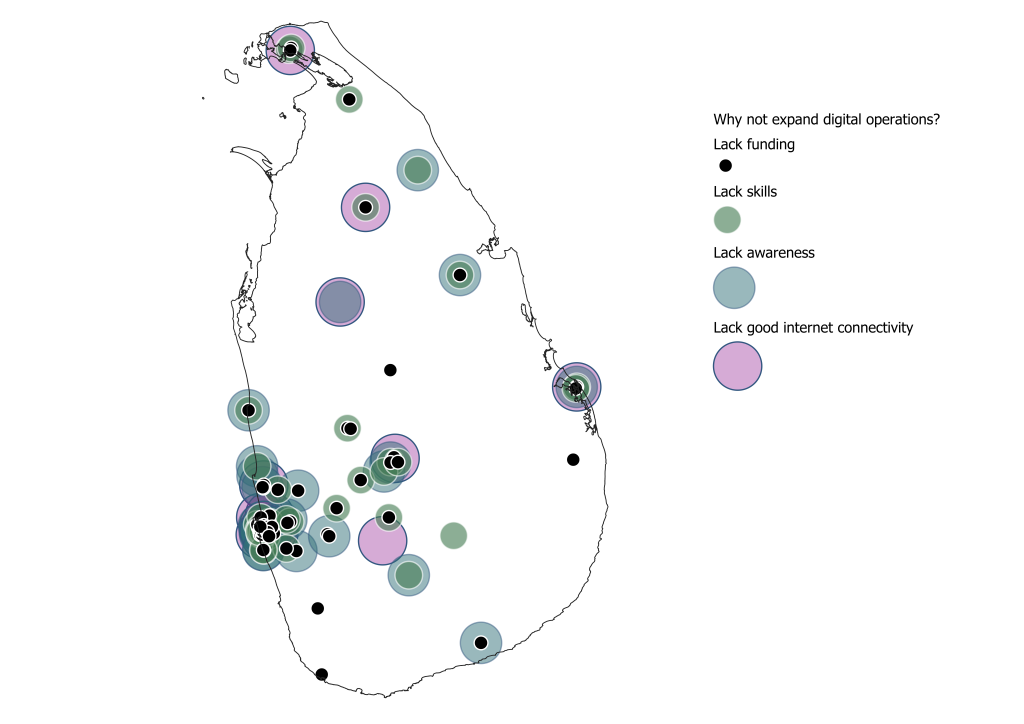By Chaya Dissanayake:
- Digital fundraising is gaining momentum in Sri Lanka.
- The Doing Good Index 2024 reveals the level of digital technology adoption in Sri Lanka and 17 other Asian economies, among other indicators of philanthropic activities.
- Enhancing cybersecurity awareness, digital capacity development, and improving existing digital infrastructure are key to promoting digital fundraising in the country.
The Suwaseriya Foundation, which hosts the 1990 free emergency ambulance service, recently raised LKR 1.2 million in donations through Karuna.lk, Sri Lanka’s first online fundraising platform. This milestone reflects the growing trend of online fundraising and digital rallying for social welfare delivery in Sri Lanka.
Much of these fundraising efforts occur through social media rather than standardised fundraising platforms. But with increased exposure to digital space comes increased risks to cyber security. In addition, social delivery organisations (SDOs) increasingly rely on digital tools to efficiently deliver vital social needs, manage their activities productively and increase organizational transparency. This article explores the potential, current status, and challenges faced by SDOs in using digital technology, drawing evidence from the Doing Good Index (DGI) Survey 2024 by the Institute of Policy Studies of Sri Lanka (IPS) and the Centre for Asian Philanthropy and Society (CAPS). The DGI examines the regulatory and societal environment in which private capital is directed towards doing good in Asia.
Leveraging Social Media for Social Welfare
SDOs are organisations that use private capital to provide goods and services addressing societal needs. They can be either non-profit or for-profit. In Sri Lanka, many SDOs are classified as non-governmental organisations (NGOs), though some, like the Suwaseriya Foundation, are affiliated with the government. Sri Lankan SDOs operate primarily in areas such as community development, education, child and youth welfare, and health.
Many of Sri Lanka’s social welfare delivery efforts occur through social media. The DGI 2024 survey found that 83 out of the 90 SDOs in Sri Lanka use Facebook for fundraising.
The user demographics of social media platforms vary. The average Facebook users are between 20-35 years old, with the average age for Asian Facebook users being 26 years old. This younger generation is more inclined to donate to causes that receive social recognition from their peers and organisations they trust and have a positive attitude towards. The survey indicates that 48% of the SDOs are confident that the public trusts their organisations and 58% of SDOs say that young people are more likely to engage in charitable activities than older generations.
Potential for Digital Advancement in SDOs of Sri Lanka
There is a lot of potential for using digital technology for activities by SDOs. Other than the use of social media for fundraising, SDOs can leverage information and communication (ICT) tools to maintain records, facilitate donations, reach new donors, and access information and opportunities online. The survey shows that around 99% of the SDOs use basic operational software such as Microsoft Office packages, surpassing the Asian average of 97%. However, only 40% of the interviewed SDOs use advanced tools like project management and accounting software compared to the Asian average of 50%.
In contrast, 47% of the SDOs use advanced software for tasks like photo and video editing and statistical analysis, higher than the Asian average of 35%. Despite this, only 58% of local SDOs have operational websites, much lower than the regional average of 78%. Digital newsletters are maintained by 55% of the local SDOs, aligning with the Asian average
While social media presence can amplify messages about welfare efforts to a broader audience, higher technological adoption can enhance the reach and efficiency of these organisations. However, increased ICT use also brings a heightened risk of cyber-attacks.
Cyber Security Concerns and Digital Usage
Sri Lanka Computer Emergency Readiness Team (CERT), under the National Centre for Cyber Security reported 64 active cyber security threats from 1 January 2024 to 30 June 2024. Among them, 34 were classified as high-risk alerts, implying the need for advanced cyber security measures in SDOs’ digital systems.
An important aspect of online fundraising is cyber security. Among the surveyed local SDOs, only 67% reported having cyber security plans in place. While only 12% reported experiencing cyber-attacks within the last two years, the threat remains significant. Scammers may not directly target the SDOs but could use their names to deceive donors. The most common tactics used by scammers are phishing (pretending to be a trusted contact, such as a bank, a well-known donor, another recognised charity organisation), pretexting (pretending to be an employee who is requesting authorization for a task), and reverse social engineering (pretending to be a person seeking support from the charity).
Maintaining a secure website and online helplines can mitigate such risks by providing donors with reliable information and support. For example, having a dedicated team to manage online interactions and monitor for potential security breaches can safeguard both the organisation and its donors. Implementing robust security measures, such as encrypted transactions and secure data storage, is crucial for building and maintaining donor trust.
The Digital Divide
Table 1: Main challenges faced by SDOs in adopting digital technologies
| Challenges | Asian Average (%) | Sri Lanka (%) |
| Lack of funding | 71 | 71 |
| Staff lack adequate skills | 59 | 53 |
| Reluctance among staff to adopt digital technology | 12 | 8 |
| Reluctance of senior leadership to support the use of digital technology | 6 | 2 |
| Lack of support from funders and/or board to invest in digital technology | 27 | 31 |
| Lack of awareness of available digital technology and tools | 46 | 36 |
| Government restrictions that make it difficult to adopt digital technologies | 7 | 13 |
| Other | 5 | 7 |
Source: Doing Good Index Survey 2024 data
The level of technology adoption varies among local SDOs. While some organisations are ahead in digital tool usage, others struggle due to factors like lack of technical expertise to fully leverage digital tools for fundraising and operations. Many organisations lack funding and investments to increase the level of technology usage. The funding issues are more prominent in Sri Lanka in comparison to the rest of Asia, than the issues such as reluctance of staff or awareness of available tools (See Table 1). Additionally, the country's digital infrastructure is not sufficiently developed to provide uniform coverage across the island. This divide has made it difficult for SDOs to expand their digital fundraising efforts.


Figure 1: The local digital fundraising environment (Authors’ illustration based on DGI 2024 survey) Left: more sophisticated digital technologies are concentrated around the urban centers of Colombo and Kandy. Right: Lack of awareness and skills are overlapping issues for many organisations.
Future Directions
As digitalisation increases, SDOs can reach a wider audience interested in charities. However, many organisations are yet to address cybersecurity concerns. Local charities need training in cybersecurity and digital skills. Collaborations with tech companies and universities can aid growth in this area. Both government and private sector efforts are needed to improve digital infrastructure and provide affordable internet access. Ensuring donor trust and transparency is also crucial. Regular project updates, transparent accounting, and clear communication can enhance donor confidence. SDOs must address concerns proactively to demonstrate their commitment to ethical operations.

Chaya Dissanayake is a Research Assistant at the Institute of Policy Studies of Sri Lanka (IPS). She holds a B.Sc. (Hons) in Agriculture specialised in Agricultural Economics from the University of Jaffna and is currently reading for an MSc in Integrated Water Resource Management at the Postgraduate Institute of Agriculture, Peradeniya. Her research interests include agricultural policies and institutions; disaster risk management; poverty and inequality; SMEs; women and workforce.
